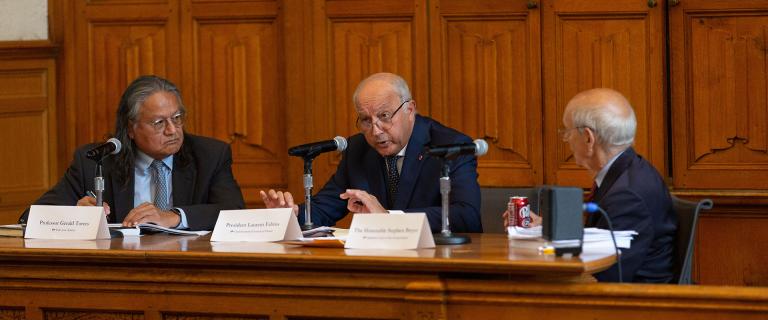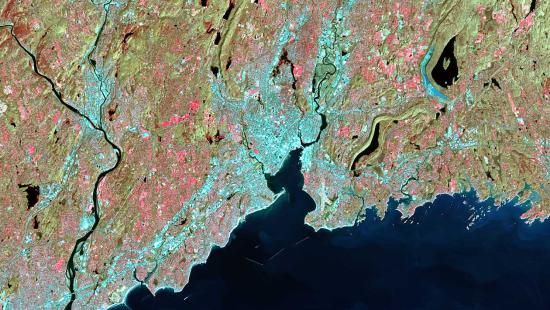

At a recent conversation hosted by the Yale Environmental Dialogue and Yale Law School, former French Prime Minister Laurent Fabius explained the “unprecedented” legal challenges surrounding the climate crisis and called on nations to “urgently” fulfill their obligations set by the Paris Agreement.
“Everybody always talks about the weather but nobody ever does anything about it.”
Stephen Breyer, retired U.S. Supreme Court justice, shared this quote, attributed to fabled author Mark Twain, to describe Laurent Fabius, former Prime Minister of France and president of the country’s Constitutional Council, at an event held September 15 at Yale Law School's Sterling Law Building, co-hosted by the Yale Environmental Dialogue.
“[Fabius] is one of those who has done something,” Breyer told the audience. “When people look back at the pioneers who saved the world, they will look back and say, ‘Thank you for what you have done.’”
The event, “Climate Change Progress: The Path Beyond the Paris Agreement,” covered the progress made since the landmark 2015 climate pact — and lack thereof — and the role law can play in tackling the “unprecedented” challenge of the climate crisis. Fabius, who now heads the highest constitutional authority in France, chaired the 2015 UN Climate Change Conference (COP21), which established the framework for the Paris Agreement.
“Climate change is an unprecedented issue from two perspectives: it is international and it is intergenerational,” Fabius said. To handle the global nature of climate change, he said, the principles laid out in the Paris Agreement must be incorporated within domestic law.

Biweekly, we highlight three news and research stories about the work we’re doing at Yale School of the Environment.
The most important course of action, Fabius said, is strengthening legal norms against climate change. Because the Paris Agreement was ratified by nearly every country in the world, the framework for appropriate climate action is already in place, he said. The remaining question is about implementation — by legal precedent, if necessary.
“There is growing momentum,” Fabius said, citing more than 1,500 environmental cases in recent years against governments and corporations. “Critics believe judges overreach their power when ruling in these cases, but I believe the opposite. Judges are not rewriting the law; they are making sure the law is informed.”
“With so many major law evolutions, judges’ rulings will be crucial. These complexities mean judges will need to be more familiar with the issues, with proper training and understanding. From my own experience, this is not an obstacle for our capacity to make decisions.”
In a back-and-forth discussion, Breyer pushed back on Fabius’ comments about the role of the court system, relating the challenges associated with each country’s unique government structure. “In the U.S., Congress makes the law,” Breyer said. “It’s not that judges hate the environment. We are concerned with the structure of the American government when it comes to decision-making and how it can greatly affect legal precedent.”
Gerald Torres, professor of environmental justice at Yale School of the Environment with a joint appointment at the School of Law, moderated the discussion. He said the conversation revealed that despite the limitations in enforcing the Paris Agreement, it is still the defining structure for global progress.
“It guides both domestic and international actions and provides a metric for assessing the recent federal climate change legislation,” Torres said. “What President Fabius exemplifies is the importance of persistence. It is the only way we will move forward.”